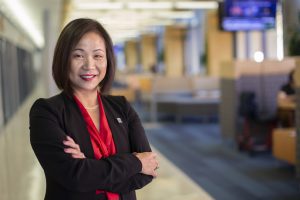By: Max Crampton Thomas


4 min read July 2020 — Higher education in Miami is using the COVID-19 crisis to come out stronger on the other end. John Quelch, dean of the University of Miami Patti and Allan Herbert Business School, discusses what that means and also talks about the post-pandemic landscape for higher education in an interview with Invest:. Florida International University (FIU) College of Business dean Joanne Li also spoke with Invest:, touching on the growing importance of online education, and what makes its new DBA program a game-changer.
How has your school continued to sustain growth in enrollment and influence?
John Quelch: The increasing strength of the University of Miami brand is one factor. We are witnessing a sizable surge in 2020 undergraduate enrollments at the university level and at the school. A second factor is the vote of confidence provided by the $100-million naming gift we received from Patti and Allan Herbert last year. Third is the global recognition and attractiveness of Miami as a place to study plus our beautiful, spacious and self-contained Coral Gables campus. Fourth, from a health and safety perspective, many parents see our campus as preferable to the congested, urban campuses of many universities in the Northeast.
Most important though is the quality and dedication of our research and teaching faculty, and the fact that we offer more degree programs that are in the sweet spot of what people are looking for. Our sustainable business MS degree is seeing a 25% enrollment increase for 2020. No matter the industry, everyone agrees that technology and analytics are increasingly important for success. Our MS in business analytics degree, recently ranked No. 8 in the world alongside Duke, is able to place almost all its students in capstone projects, internships or full-time employment, even in this challenging environment. In addition to our redesigned full-time MBA, another important degree program is our MS in finance, which supplies a flow of talent to the wealth management, private equity and venture capital firms coming into the Miami area.
How have you approached online education?
Joanne Li: Eight or nine months prior to COVID-19, FIU Business expanded its offering strategically and methodically. By spring 2021, FIU Business will offer 10 online programs that have a substantial market space. FIU was one of the first adopters of online education, which began more than two decades ago. Now, we see growing demand for this kind of degree, especially as FIU has been diversifying its student population more and more. As a state university, we are expected to offer degrees aligned with market needs.
On an undergraduate level, we are the leader among all colleges within FIU in providing online education; of all the courses we offer, 40% are considered online education. The goal is to allow a more agile learning model for the student and to meet the student’s needs. Most of our student body is a 21st century workforce, who work or take internships while studying.
We launched our Doctor of Business Administration (DBA) in 2018. We are one of only three state universities in Florida offering this degree. This program targets candidates who already made it to a C-Suite level and yearn for higher levels of business education. Since we accepted our first cohort, the program has been extremely successful, and it is a new trend for business education. Many universities across the globe have been talking about this need but are unsure about implementation. Before COVID-19, FIU Business had already become even more attuned to the business environment and needs of the candidate.
This model is often perceived as a direct competitor for many often expensive and time-consuming full-time MBA programs, especially for candidates who already have been integrated into the working world. The DBA also feeds into this new trend of a stackable, specialized master’s degree. It is a hybrid model that allows students to continue with their careers while studying. Our responses have been timely and position the college to pivot and prepare for the next wave of demand in the market.
What impact will the pandemic have on the education sector or on your institution in the near term?
Quelch: Overall, I expect many colleges and smaller universities to be financially challenged and forced to merge or go out of business. The University of Miami is scheduled to open on Aug. 17, 2020. We are fortunate and reassured to have a global public health expert as president of the University of Miami. To navigate the current challenges, any university needs to see a high level of community commitment from students, faculty and staff. All of us are going to have to wear masks, follow physical distancing guidelines, be disciplined and set a good example. We are confident that the strength of the University of Miami community is such that people will endure personal inconvenience for the common good.
Li: By Aug. 24, FIU is scheduled to start repopulating the campus with the four adapted teaching modalities: face to face, online, hybrid and synchronized remote learning, which was introduced in March. FIU Business set out four guiding principles in May. The first is that we will transition our constituency back to normalcy to the best of our ability. The second is that we will honor the teaching modality as we marketed and advertised it, as far as we can. Students can choose to rotate from face-to-face to remote or they can be designated as a remote student through a hybrid model or they can select a fully online format. The third principle is maintaining the use of the classroom and we will take responsibility for making sure that students always have the right tools. The last principle is that we will always consider alternative testing as a result of this pandemic. Certainly, we are still in a very fluid situation but having a plan allows us to prepare for scenarios.
It is important that we retain students and they stay in school. This is a very difficult time for students as many of them or members of their families lost their jobs. To survive this lockdown, everybody has to chip in, and we allocated some of our CARES Act funds to provide financial support.
How do you balance face-to-face education with technology and virtual learning and what does this mean for higher education?
Quelch: The need to switch to virtual teaching to deliver our spring semester courses was not as disruptive as I expected. We all pulled together and did pretty well, though we must improve our online teaching skills further as student expectations will be higher when we reconvene in the fall. We completed our tenure-track hiring early in the year so we will have five new tenure-track professors joining us in the fall.
The area where we are having to do the most reinvention is non-degree executive education. We had approximately $1 million worth in contracts that had to be postponed. We are exploring how to move from a 100% face-to-face delivery proposition to a value-added proposition that includes a more blended solution, often with modular engagement. We are breaking programs into bite-sized learning modules that can be delivered virtually over a week, a month or a couple of months.
Regarding our graduate and undergraduate programs, the challenge as we move into the next semester is to figure out how to best leverage our physical space on campus to maximize the percentage of course delivery that can be face-to-face. We hope to deliver a hybrid solution, balancing face-to-face and online modalities, dividing classes into subgroups to insure physical distancing. We have not seen reductions in applications; in fact, at the graduate level, we have seen a strong uptick, particularly in applications to our online and full-time MBA programs.
Li: We conducted a student survey during the COVID-19 changes, asking about home and education arrangements. Many said they would like to come back and interact with their professors and fellow classmates. This means we have to be better in being learner centric. We need to ensure student learning takes place and student success is achievable regardless of the delivery method. We can do this by making the environment a lot more conducive for the learner. We need to make discussions meaningful on an online platform. At FIU Business, we intend to accommodate students who prefer to show up in person as well as those who want to remain remote. We will vastly implement technology, both hardware and software, to encourage the interactions. The technology is not new, but the teaching pedagogy and implementation are. Now, there is no excuse. We cannot unlearn the lockdown, so we may as well make ourselves very good at adapting. This is a defining moment for higher education.
To learn more about our interviewees, visit:
